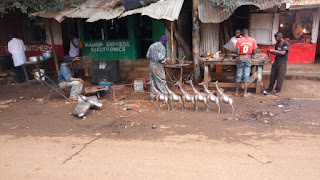 |
| Kibera Slum |
We'll start with how Art Roamers came to meet Samuel. When Jeff and Susan were driving around the Kibera slums last year, they were actually looking for one of their contacts that was, and still is, working in one of the schools. Trying to navigate the slum is very challenging. There are a few roads, but they are not like roads in America. They are narrow, they probably aren't going to be paved, and there is little traffic control. There are no addresses. The slum is divided into villages to help you navigate. Then, some of the roads have names to help you along, but, again, no addresses. When looking for the school, they were asking locals for help to find it, and ended up getting close after they were in the right village and what roads were near it.
 |
| One of the paved roads. The large building in the background is government built apartments |
 |
| This little girl was directing traffic |
 |
| Picture from the school |
 |
| Work in progress from Samuel's shop |
Samuel was born in Western Province, Busia County, Bumala. Samuel is halfcust, meaning his parents were from different tribes. His father was from the Lukha tribe, and mother was from the Luo tribe. The Lukha tribe is a subgroup of the Nuba, found in the Nuba mountains in Sudan, and the Nyanza province is where the Luo are. Nyanza is in the southwestern corner of Kenya, where Lake Victoria comes in. The Western Province is directly north of Nyanza. In more recent years, more people are leaving the tribal areas and going to the slum and other populated areas, seeking work in order to survive and support their families. In other cases, children may come to live with relatives for education opportunities, or out of necessity.
Samuel came from a large family, 2 boys and 5 girls. One of the girls died, so then there were four. Samuel moved to the Kibera slums when he was five years old after his father died. One of his sisters was living there running a small business, and she took over his care. Samuel did not get to attend school, he worked as a hawker in the slum, selling orange fruit.
After his sister married, his brother in law enrolled him in a welding course. At eighteen, he was able to learn a trade and worked building windows and doors. The windows have metal bars on them. The doors down there aren't like the doors used on American homes. They are heavy, and made of steel. They aren't meant to mark the threshold of where “outside” ends and “inside” begins. The windows and doors that they build and use down there are meant as a means of protection.
 |
| Doors built in the slum |
After some time, Samuel was approached to do a commissioned piece of art. He was asked to sculpt Jesus on the cross. When Samuel talks about creating the piece, he says that everything went perfectly and what he made was perfect. It was then that he knew that art is what he is meant to do. He has been creating art for ten years, since 2008. When you see his pieces, knowing that they are metal and seeing the scale that he makes them is impressive, alone. But then as you learn more about where they come from, the pieces are made from 55 gallon steel drums. It's not like he can get sheet metal and then start working with it. To be an artist living in the Kibera slum has so many challenges. He works with what he has and what he can get. When describing Samuel and the people living slum in general, Jeff often says, “They just do so much, with so little,” followed by a reflective pause.
 |
| Sorting for recyclables |
Samuel also has a family that depends on him. Samuel has been married to his wife for seven years. They have three children, ages 6, 4, 2. His family and faith are the most important to him. It is humbling to think about Samuel and his family, living where they do, and that they are happy and Samuel spends his days making art. I hope to get to meet him someday, and I'll get to see the world with a different perspective.
As a final note, we are anticipating a shipment of new sculptures soon! We'll let you know when we'll have them in!









No comments:
Post a Comment